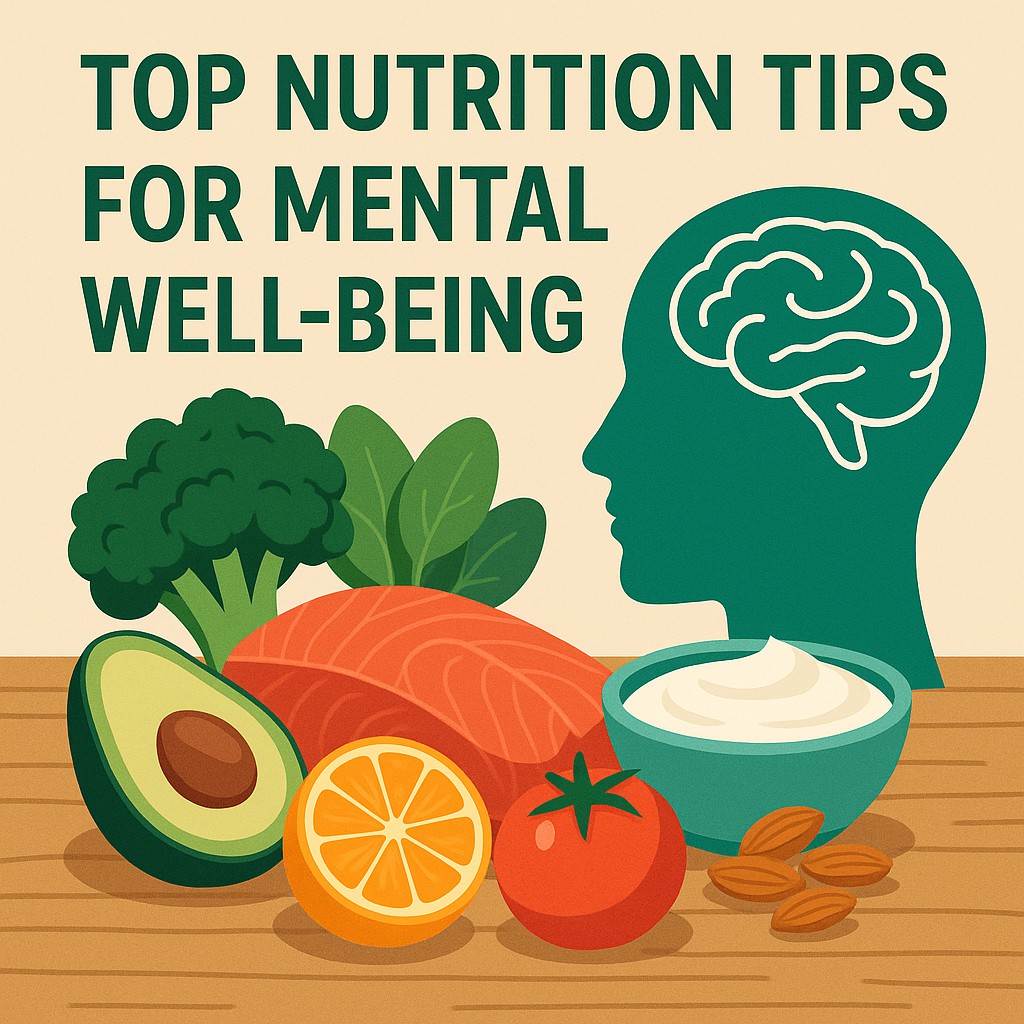Nutrition Tips for Mental Well-Being
In recent years, science has increasingly confirmed what many ancient cultures have long believed: our diet affects more than just our physical health. In fact, the connection between food and brain function is stronger than ever. That’s why understanding the best nutrition tips for mental well-being is essential in today’s fast-paced, stress-heavy world. Whether you’re battling anxiety, low energy, or chronic stress, what you eat can make a real difference in how you feel emotionally and mentally.

Why Nutrition Matters for Your Mind
The brain is the most energy-demanding organ in the body, consuming about 20% of our daily caloric intake. Therefore, just like a high-performance engine, it requires quality fuel to function optimally. Nutrients influence the production of neurotransmitters, regulate inflammation, and balance gut bacteria, all of which are deeply linked to mental health.
Moreover, growing evidence suggests that poor dietary choices may contribute to the development of mood disorders such as depression and anxiety. On the other hand, adopting simple yet effective nutrition tips for mental well-being can dramatically boost mood, focus, and resilience.
Balanced Diets: Nutrition Tips for Mental Well-Being
A balanced diet is the cornerstone of good mental health. It ensures that your brain receives the right mix of macronutrients and micronutrients. For instance, omega-3 fatty acids, complex carbohydrates, and lean proteins work synergistically to support emotional stability.
Furthermore, variety is key. Incorporating a rainbow of fruits and vegetables provides antioxidants that fight off oxidative stress, which has been linked to cognitive decline and mood disorders. So, the next time you’re at the grocery store, aim for a colorful cart.
Omega-3s: Nutrition Tips for Mental Well-Being
One of the most powerful nutrition tips for mental well-being involves increasing your intake of omega-3 fatty acids. These essential fats, found in fatty fish like salmon and mackerel, help reduce inflammation and support brain cell structure.
Additionally, omega-3s influence dopamine and serotonin levels, the “feel good” neurotransmitters that affect your mood. If you’re not a fan of fish, flaxseeds, chia seeds, and walnuts are excellent plant-based alternatives.
How to Incorporate More Omega-3s
To include more omega-3s in your diet, try swapping out red meat for grilled fish twice a week. Moreover, adding a tablespoon of ground flaxseeds to your morning smoothie is both easy and effective.
Gut-Brain Nutrition Tips for Mental Well-Being
Surprisingly, about 90% of serotonin, a key mood-regulating chemical, is produced in the gut. Therefore, maintaining a healthy gut microbiome is vital for mental health. Probiotic-rich foods like yogurt, kefir, sauerkraut, and kimchi can help populate your gut with beneficial bacteria.
In addition, prebiotic foods such as garlic, onions, and bananas serve as nourishment for these good bacteria. When your gut is happy, your mind often follows.
Easy Ways to Support Gut Health
Start your day with probiotic yogurt topped with bananas and oats. Not only is it delicious, but it also aligns with key nutrition tips for mental well-being by feeding your gut and boosting serotonin levels.
Reduce Sugar for Better Emotional Stability
Although sugary snacks offer short-term pleasure, they often lead to mood crashes and irritability. Excessive sugar intake spikes blood glucose levels, followed by a rapid drop that can negatively impact concentration and mood.
Consequently, one of the best nutrition tips for mental well-being is to minimize added sugars and opt for natural sources like fruit or dark chocolate when cravings strike.
Stay Hydrated: Nutrition Tips for Mental Well-Being
Dehydration doesn’t just cause headaches or fatigue; it also impairs cognitive performance and mood regulation. Even mild dehydration can lead to anxiety-like symptoms or difficulty focusing.
Therefore, keeping a water bottle nearby and drinking regularly throughout the day is one of the simplest yet most effective nutrition tips for mental well-being.
Hydration Hacks You Can Use Today
Set hourly reminders to sip water or infuse it with fruits like lemon or cucumber for flavor. You can also increase fluid intake through water-rich foods like cucumbers, oranges, and watermelon.
Caffeine and Alcohol: Nutrition Tips for Mental Well-Being
While coffee and wine may have their place in social settings, overconsumption can harm mental health. High caffeine levels may trigger anxiety, while alcohol disrupts sleep and reduces serotonin production over time.
Instead of quitting cold turkey, gradually reduce intake. Choose herbal teas or decaf options when possible. This is another impactful way to apply effective nutrition tips for mental well-being.
Boost Mood with B Vitamins and Magnesium
B vitamins, especially B6, B12, and folate, play a major role in regulating mood and brain function. Likewise, magnesium helps calm the nervous system and is essential for sleep and relaxation.
Unfortunately, many modern diets are deficient in these nutrients. That’s why one of the top nutrition tips for mental well-being is to increase intake of foods like leafy greens, legumes, whole grains, and fortified cereals.
Supplement If Necessary, But Safely
If you suspect a deficiency, consult your doctor and consider taking a high-quality supplement. Always opt for lab-tested brands and avoid self-diagnosing.
Mindful Eating: Nutrition Tips for Mental Well-Being
Mindful eating is more than a trend: it’s a transformative approach to reconnecting with your body’s needs. When you slow down and savor each bite, you’re more likely to choose nutrient-dense foods and recognize fullness cues.
Moreover, this practice encourages gratitude, reduces overeating, and fosters a positive relationship with food. It’s one of the more holistic nutrition tips for mental well-being that also supports emotional balance.
Build Long-Term Habits with Nutrition Tips for Mental Well-Being
Implementing these changes doesn’t have to be overwhelming. In fact, making small, consistent shifts in your diet can yield powerful results over time. Start by changing one meal per day, such as choosing oatmeal over sugary cereal for breakfast.
Additionally, involve your family or roommates in meal prep to make healthy eating more enjoyable. By building sustainable habits, you’re investing in both your physical and mental future.
Conclusion
To sum up, the link between diet and mental health is too strong to ignore. By applying these nutrition tips for mental well-being, you can experience better mood, sharper focus, and greater emotional resilience. Whether it’s adding omega-3s, cutting sugar, or eating mindfully, each step contributes to a healthier, happier mind.
Remember: food is not just fuel. It’s information. It tells your body, and your brain, how to feel, function, and flourish.
